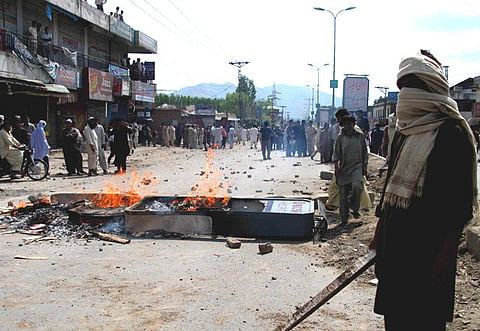Ethnicity main cause of clashes
Hindko speakers in Hazara Division feel left out in Khyber Pakhtunkhwa

Dubai: The proposed renaming of the North West Frontier Province (NWFP) as Khyber Pakhtunkhwa has led to series of bloody clashes between the security forces and residents. The province is already witnessing a war on terrorism for the past few years.
The week-long skirmishes in Hazara Division — the second largest of the seven divisions of the NWFP — have left 12 dead and more than 200 injured.
The proposal to change the name has infuriated the more than five million Hindko-speaking community. They comprise one-fourth of the 21 million population of the province.
The community is mainly settled in Hazara Division bordering with Islamabad, and the centre of resistance against the renaming has been the main city of Abbottabad. A peaceful city and a great tourist attraction, it saw the bloodiest clashes in its history on Monday after protesters clashed with the police.
Protests started as soon as the Parliamentary Committee on Constitutional Reforms proposed a constitutional package on March 31 this year to the National Assembly that included changing the Province's name to Khyber Pakhtunkhwa.
The renaming of the NWFP as Khyber Pakthunkhwa has gone down badly in the Hazara region and there appears to be genuine grassroots dissent against a name that the non-Pakhtun, Hindko-speaking population of the region does not identify with.
Pakhtunkhwa means ‘land of Pakhtoon' (Pakhtoons are Pushto-speaking community who are in a majority in NWFP. As such the renaming has left other communities fuming.
Hindko speakers are the second largest community in the province and largely live in Hazara Division. There is a huge presence of Seraiki and Balochi-speaking community in D.I Khan Division of the province and they are also not happy with the renaming issue. Protest rallies were also held in Haripur and Mansehra districts of Hazara Division.
Political parties also added fuel to the fire as they tried to cash in on the situation. Pakistan Muslim League-Quaid (PML-Q) which lost the elections to Nawaz Sharif's Pakistan Muslim League-Nawaz (PML-N) in this division is reportedly blaming Sharif's party for not protecting the rights of the people in their areas.
What happened in Abbottabad appeared to be tied to a struggle between the PML-Q and PML-N in the first instance and the lack of a prompt public-awareness campaign in the Hazara region, generally by the Awami National Party (ANP) led provincial government.
The renaming proposal was added into the constitutional package called the 18th amendment as it was a major condition of ANP leaders to form an alliance with the Pakistan Peoples Party-led government.
"The government is trying to divide the province on the bases of ethnicity and language and this move would lead to unrest," said Iftikhar Khan, a Dubai-based former mayor of Haripur district in Hazara.
Referendum
He proposed the government should hold referendum in the province and should rename the province with consensus if it is necessary at all.
"The government should focus on other pressing issues such as terrorism, unemployment, education, health and price hike instead of playing with the sentiments of the people," he said, adding that the renaming bid would lead to division of the province into smaller provinces.
It was in 1901, when the North West Frontier Province was carved out of Punjab. The province was merged into what was called ‘One Unit' in 1955, with Lahore becoming the capital of the new administrative unit.
General Yahya Khan dissolved the ‘One Unit' in July 1970 and restored the provinces of the NWFP, Punjab, Sindh and Balochistan. The 1973 Constitution continued with the British nomenclature.
The Pakhtun nationalist parties including ANP, however, continued to press for a change of name.
Alternatives included Pashtunistan, Pakhtunkhwa and Afghania. NWFP borders Afghanistan to the north west, Gilgit-Baltistan to the north east, Pakistan-administered Kashmir to the east, the Federally Administered Tribal Areas (FATA) to the west and south, and Punjab and Islamabad Capital Territory to the south east.



